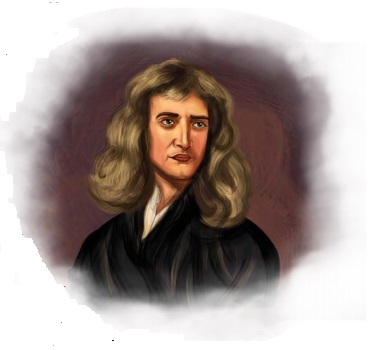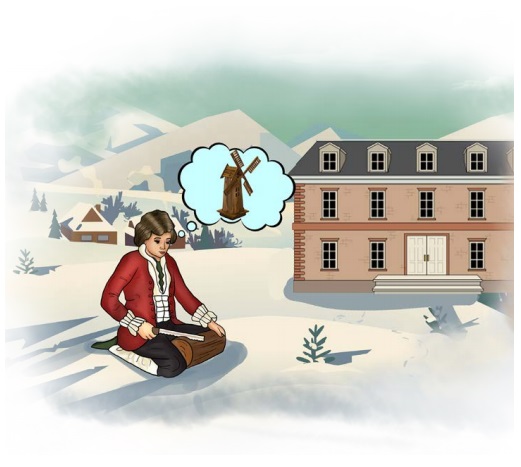Prose by Nathaniel Hawthorne - Unit 3 - 8th English - Sir Issac Newton - The Ingenious Scientist: Section I | 8th English : Unit 3 : Prose : Sir Issac Newton - The Ingenious Scientist
Chapter: 8th English : Unit 3 : Prose : Sir Issac Newton - The Ingenious Scientist
Sir Issac Newton - The Ingenious Scientist: Section I
Unit 3
Prose
Sir Issac
Newton - The Ingenious Scientist
Nathaniel Hawthorne

Section -I
Reading
Read the following passage
on Sir Isaac Newton.
On Christmas-day, in the year 1642, Isaac Newton was born at the
small village of Woolsthorpe in England. Little did his mother think,
when she beheld her new-born babe, that he was destined to explain many matters
which had been a mystery ever since the creation of the world.

Isaac's father being dead, Mrs. Newton was married again to a clergyman,
and went to reside at North Witham. Isaac was left to the care of his good old grandmother,
who was very kind
to him, and sent him to school. In his early years, Isaac was chiefly remarkable
for his ingenuity in all mechanical occupations.
He had a set of little tools, and saws of various sizes, manufactured by himself. With the aid
of
these, Isaac
contrived to make many curious articles,
at which he worked with so much skill, that he seemed to have been born with a saw
or chisel in his hand.
The neighbors looked with vast admiration at the things which Isaac
manufactured. And
his old grandmother, I suppose, was never weary of talking about him.
"He'll make a capital workman, one of these days," she
would probably say. "No fear but what Isaac will do well in the world, and
be a rich man before he dies."
Some of his friends, no doubt, advised Isaac's grandmother to apprentice him to a clockmaker; for, besides his mechanical skill, the boy seemed
to have a taste for mathematics, which would be very useful to him in that profession.
And then, in due time, Isaac would set up for himself, and would manufacture curious
clocks, like those that contain sets of dancing figures, which issue from the dial-plate
when the hour is struck; or like those, where a ship sails across the face of the
clock, and is seen tossing up and down on the waves, as often as the pendulum vibrates.
Indeed, there was some ground for supposing that Isaac would devote
himself to the manufacture of clocks; since he had already made one, of a kind which
nobody had ever heard of before. It was set a-going, not by wheels and weights,
like other clocks, but by the dropping of water. This was an object of great wonderment
to all the people in the neighborhood; and it must be confessed that there are few
boys, or men either, who could contrive to tell what o'clock it is, by means of
a bowl of water.
Besides the water-clock, Isaac made a sun-dial. Thus his grandmother
was never at a loss to know the hour; for the water-clock would tell it in the shade,
and the dial in the sunshine. The sun-dial is said to be still in existence at Woolsthorpe,
on the corner of the house where Isaac dwelt.
Isaac possessed a wonderful faculty of acquiring knowledge by the simplest means. For instance, what method do you
suppose he took, to find out the strength of the wind?. He jumped against the wind;
and by the length of his jump, he could calculate the force of a gentle breeze,
a brisk gale, or a tempest. Thus, even in his boyish sports, he was continually
searching out the secrets of philosophy.
Not far from his grandmother's residence there was a windmill, which
operated on a new plan. Isaac was in the habit of going thither frequently, and
would spend whole hours in examining its various parts. While the mill was at rest,
he pried into its internal machinery.
When its broad sails were set in motion by the wind, he watched the process by which
the mill-stones were made to revolve, and crush the grain that was put into the
hopper. After gaining a thorough
knowledge of its construction, he was observed to be unusually busy with his tools.

It was not long before his grandmother, and all the neighborhood,
knew what Isaac had been about. He had constructed
a model of the windmill. Though not so large, I suppose as one of the box-traps which boys set to
catch squirrels, yet every part of the mill and its machinery was complete. Its
little sails were neatly made of linen, and whirled round very swiftly when the
mill was placed in a draught of air. Even a puff of wind from Isaac's mouth, or
from a pair of bellows, was sufficient to set the sails in motion. And what was
most curious if a handful of grains of wheat were put
into the little hopper, they would soon be converted into snow- white flour.
Glossary
ingenuity (n) – the ability to invent things
/ creativity
contrived (v) – created / invented
apprentice (v) – works for someone to learn
skill
acquiring (v) – getting knowledge or skill
pried (v) investigated
hopper (n) – funnel shaped bins for
feeding grains into mills
Read and Understand
A. Fill in the blanks.
1. Issac Newton
was born at a small village of
Woolsthorpe in England.
2. Grand mother was advised
to apprentice him to a clockmaker.
3. Isaac made a clock, by
the dropping of water.
4. The sun-dial made by Isaac
is still in existence at Woolsthorpe.
5. Isaac constructed a model
of the windwill.
B. Choose the correct synonyms for the italicized words.
1. Isaac was chiefly remarkable for his ingenuity.
a. common
b. notable
c. neglected
d. unknown
[Answer: (b) notable]
2. He will make a capital
workman.
a. wealth
b. excellent
c. profitable
d. head
[Answer: (a) wealth]
3. Nobody could tell what
the sunshine was composed of.
a. made
b. known
c. full
d. felt
[Answer: (a) made]
4. He cared
little for earthly fame and honors.
a. Disrespect
b. attraction
c. proud
d. popularity
[Answer: (d)
popularity]
Related Topics